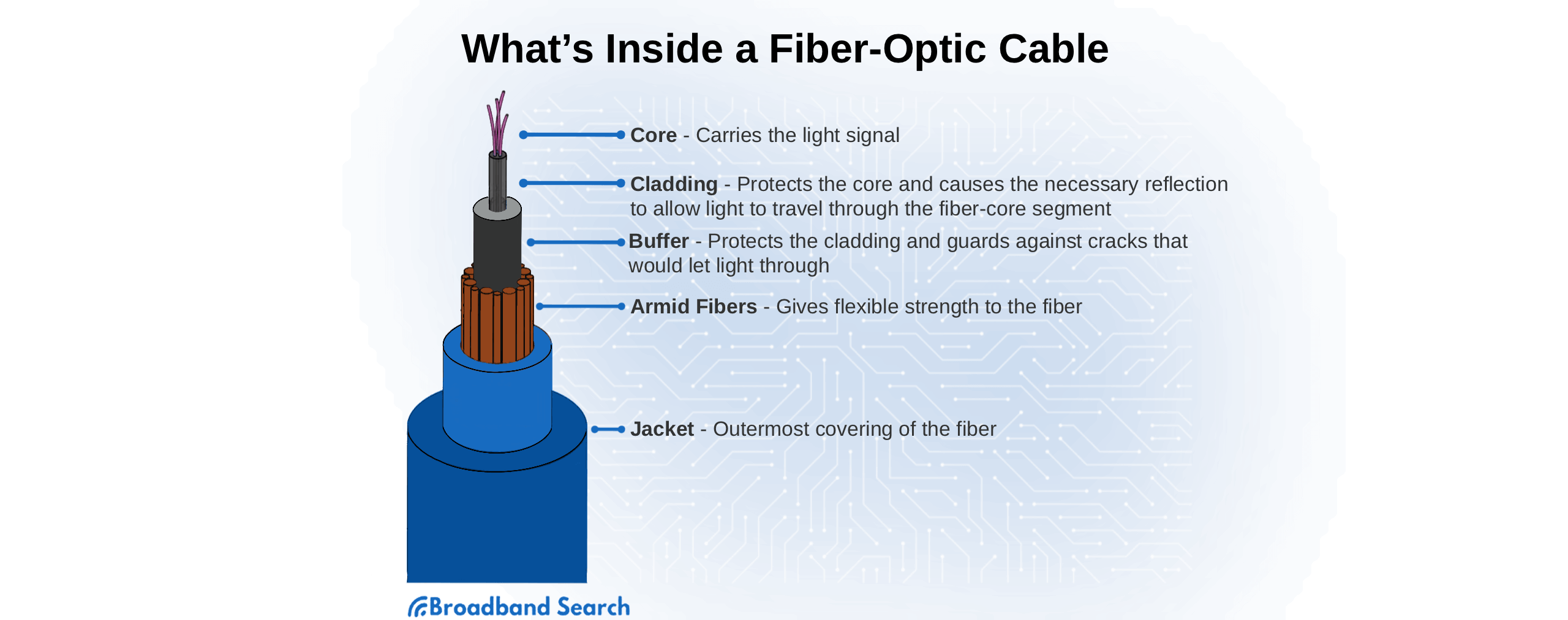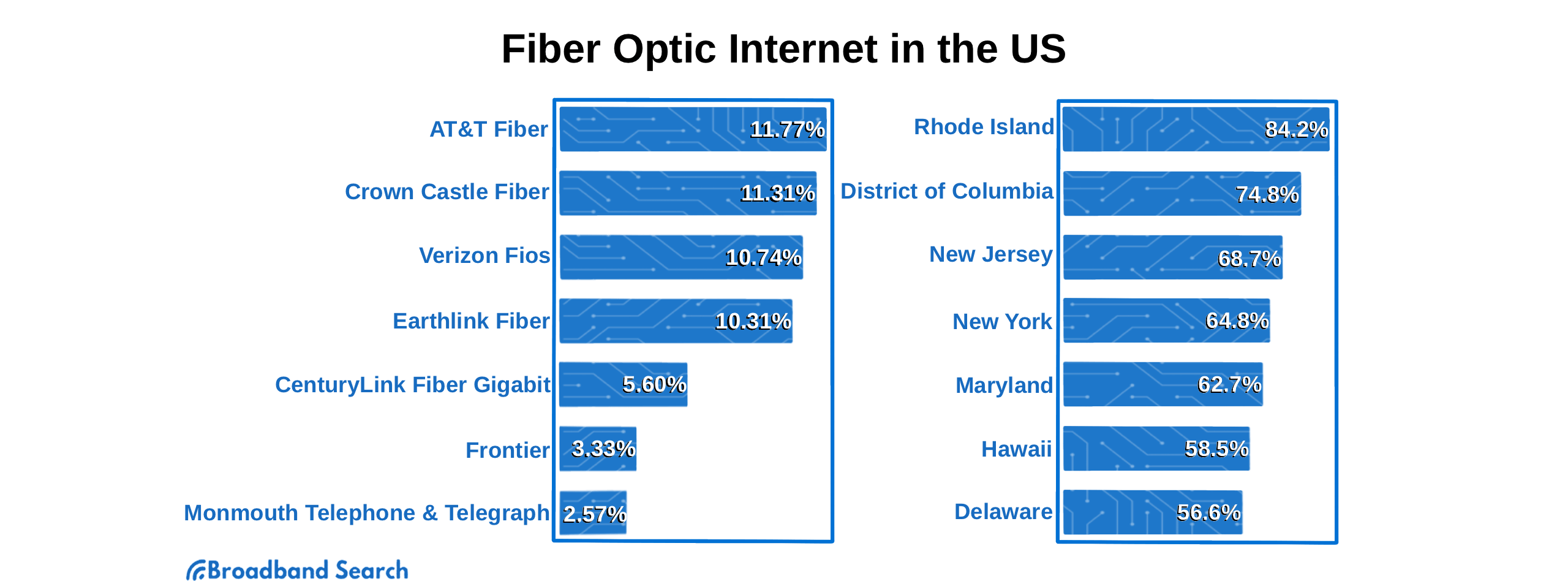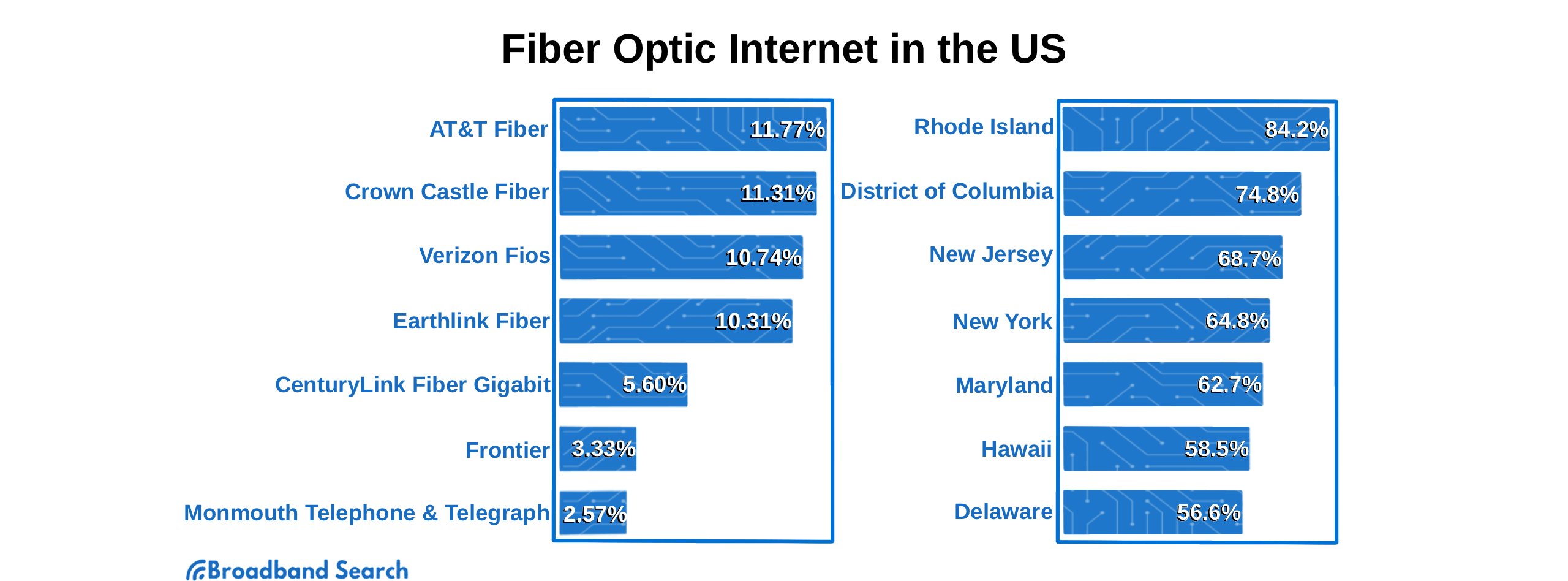In an effort to stimulate local economies, several cities throughout the United States have made attracting new entrepreneurs and businesses a top priority. Often, struggling cities use tax breaks or other business-friendly practices to lure potentially lucrative startups to their respective area.
Especially proactive cities have taken such incentives a step further, fostering long-term growth by investing in their infrastructures, specifically high-speed internet, as a way to attract promising business interests to their city.
The goal is to keep young, upwardly mobile people from leaving. As cities contemplate the potential positive impact that ultra-high-speed internet could have on their goals for growth, they need to look no further than US cities that have already invested in the fiber optic infrastructure needed to reach 1 Gbps internet speed.
How can a Business Benefit from High-Speed Fiber Optic Internet?
There are numerous benefits that businesses stand to gain with a fast internet connection. In addition to downloading and sending large files across the Web in seconds, businesses can also back up crucial data on cloud-based applications rather than relying on hard drives that are susceptible to crashes and other physical disasters.
Also, inefficient or more expensive landline telephone services can be easily replaced with a VoIP system, which translates into lower telecommunication costs. A high-speed fiber connection allows businesses to experience the same crystal clear reception through their VoIP service as they did through their landline.
Finally, a fast internet connection enables real-time, remote communication among collaborators and across project management software platforms. Project management software promotes a more effective teamwork environment by keeping employees focused on larger company goals and initiatives.
A fast, reliable internet connection eliminates the barriers that often stifle progress and slow productivity toward this end. With all these benefits in mind, it's no wonder that new business owners often make finding a city with high-speed internet a top priority when determining the location of their startup.
Other benefits include.
Internet Speed
Sheer speed is unquestionably the single biggest bonus that a city with high-speed internet can offer a prospective business. Typically, we’re talking about a fiber connection that reaches either 1 Gbps or 2 Gbps. Regardless of what a business does online, these kinds of speeds are fast enough to support it.
Stronger Signal and Reliability
One of the inherent benefits of fiber internet is that it does not require an electrical current to keep the signal flowing. This differs from copper wire-based internet like DSL and cable which go down in the absence of electricity. The glass fibers that comprise a fiber cable transmit internet signals by flashes of lights. The only way it would go down would be a physical intrusion.

Fast Access to the Cloud
We touched on this earlier. The speeds reached by fiber internet make it feasible to perform a daily cloud backup rather than storing it locally. Without fiber, even a small to medium-sized company might have too much data to efficiently back it up offsite. High-speed internet also opens it up for a business to take advantage of third-party SaaS (Software as a Service). This allows a company to hand off maintenance tasks like cybersecurity.
Multiple Simultaneous Users/Devices
A pleasant side effect of all that speed and bandwidth is that you can have many more users and devices going at the same time without slowing the whole network down. Too much traffic can definitely clog up a satellite, DSL, or cable internet connection. The chances of ever overloading a fiber network are none and slim.
Better Security
Fiber optic technology offers enhanced security because of its unique nature. Data is transmitted as flashes of light that approach the speed of light. Your average hacker is going to have more trouble trying to intercept than data sent along traditional copper wires. It is also such a higher level of technological sophistication that system administrators are more likely to notice a hack attempt.
Decreased Stress on Staff
If you’ve ever tried to get anything done using slow internet, you understand how frustrating it can be. You end up spending more time fighting with the technology than actually doing the job you were hired to do. On the flip side, fast fiber internet relieves technical stress and allows staff to spend their time doing the things that make the company more money.
Save Money and Time
Saving money and time goes along with the previous section. A slow, unreliable internet connection creates inefficiency that can have a real effect on the bottom line. In addition to extra stress, staff ends up spending more time than is necessary doing simple things like navigating the internet.
How Slow Internet Can Spell Trouble for a Business
Sometimes a real-world example is the best way to make a point.
In College Station, Texas, co-founder of Exosent Engineering, Andrew Duggleby, experienced first-hand the frustrations of a business owner dealing with an inefficient internet service provider (ISP).
Exosent Engineering designs and manufactures tanker trucks for the oil industry. Duggleby relies on data-intensive 3D models to showcase the company's products to potential clients. Thanks to slow, insufficient internet speeds, Duggleby has to download the 3D models onto a hard drive and ship the hard drive to his clients.
"We're doing three-dimensional computer-aided design, big 3D models," Duggleby explains. He goes on to lament, "So here we are, this super-advanced engineering company, with all these technologies... but then it can't get past the walls."
There's no doubt that having a faster, more reliable ISP would save Duggleby time, money, and enhance his company's credibility in the eyes of potential clients.
Consider Duggleby’s dilemma of slow internet speed in light of the following areas:
- Employee morale and performance
- Poor customer experience
- Slower business growth
Slow Work Pace and Degraded Employee Performance
Slow internet in the workplace has the same effect as asking an employee to do a job but then not giving them the proper tools. In short, it frustrates workers, resulting in lower-quality work product and eventually reduced sales. The whole thing is a vicious cycle. Working with the “wrong tools” yields frustration and slower performance. You can bet that eventually, they will be looking for a different job, one that supplies adequate internet.
Poor Customer Experience
There are a couple of different ways slow internet can result in a poor customer experience. We’ve discussed employee frustration in not being able to complete tasks on time. Missed deadlines annoy customers. It might eventually annoy them enough that they decide to take their business elsewhere. Additionally, slow internet could yield a slow or malfunctioning company website. In a world where internet users have a notoriously short attention span, even having to wait a few extra seconds when trying to order online can send a potential customer elsewhere with their business.
Slower Business Growth
Frustrated employees and customers are not the kind of environment where remarkable business growth occurs. Employees quit. Customers go elsewhere. This is how slow internet can inhibit a company’s growth or even turn a profitable company into one that is not. When it comes right down to it, a business that refuses to spend money on quality internet connections is one that is not serious about making money.
Fast Internet Stimulates Unbelievable Growth in the US
After being dubbed the "dirtiest city in America" by Walter Cronkite in 1969, Chattanooga, Tennessee was one of the last places an entrepreneur would consider starting a new business.
The establishment of a smart grid in 2009, however, aimed to provide insight into how electricity was used in the city and provided Chattanooga with the infrastructure necessary to support fiber-optic Internet.
Chattanooga now exemplifies the profound and positive impact being able to offer speeds up to 1 Gbps can have on a local economy. Commonly referred to as "The Gig," high-speed internet has turned the once dirty town into a technology hub with billions of dollars in new investments and a healthy flock of incoming entrepreneurs looking to take advantage of the top-notch Internet speeds.
Downtown Chattanooga now sports an "Innovation Zone." Each year, there's a 14-week summer entrepreneur program that's focused on highlighting the best ways to utilize gigabit broadband. In recent years, the Gig has boosted Chattanooga's local economy, allowing the city to experience the 3rd highest wage growth of all mid-sized American cities.
Kansas City, Missouri experienced a similar growth spurt following its introduction to Google Fiber. The Kansas City Startup Village was established by a group of entrepreneurs and now serves as a startup community in the Kansas City region.
Synthia Payne, who started a social media website called CyberJammer, moved from Denver to Kansas City exclusively for the ultra-fast connection the city could now provide. CyberJammer's business model centers on the ability of musicians to communicate instantaneously with one another online. The sufficient bandwidth that Google Fiber provides is a critical part of that operation.
Furthermore, in both Kansas City and Chattanooga, the introduction of fiber-optic internet has led other companies who are looking to cash in on this opportunity to enter the market.
This increased competition has helped drive down prices, making the services more affordable for businesses and residents alike. In fact, since the initial introduction of these fiber optic services, both Kansas City and Chattanooga businesses and residents have multiple internet providers from which to choose.
Success in Kansas City and Chattanooga Inspires Detroit
The success stories of Kansas City and Chattanooga have inspired other struggling cities to realize and engage the impact of the internet as a means to promote growth in their own cities and create the environment in which the next Apple or Google could develop.
Rocket Fiber, a startup ISP in Detroit, sees the Motor City's long-term recovery relying on having an ISP that can deliver ultra-fast speeds.
Detroit is currently served by Comcast. Rocket Fiber intends to enter the market offering speeds up to 1 Gbps that will be $45 cheaper than Comcast's fastest plan. Edi Demaj, a co-founder of Rocket Fiber, visited Kansas City and saw firsthand how gigabit service could transform a city.
"A lot of companies moved to Kansas that would have never moved to Kansas," Demaj explains. "We want to make sure Detroit is one of a handful of cities to have gigabit service to the residence."
But the Digital Divide is Still in Effect
In recent years, a term has come into use to explain the lack of high-speed internet in rural areas of the US - the Digital Divide. The basic issue is that urban areas have access to a variety of fast internet options while rural areas often have no choice other than satellite internet, which is not really high speed at all.
As a side note, the FCC lists the minimum speeds required to qualify as “high-speed” as 25 Mbps download speed and 3 Mbps upload speed. It just so happens that traditional satellite companies advertise their speed at 25 Mbps, though they often aren’t able to hit that benchmark.
While some telephone companies advertise their DSL service that comes in through the phone jack as “high-speed,” they may not guarantee you’ll get any better than 6 Mbps. This is obviously not high-speed by any definition.
So, rural residents are left without a reliable way to take advantage of the various online activities afforded by high-speed internet: online business pursuits, entertainment, education, and more. Trying to use today’s modern high-bandwidth internet with a slow connection is an exercise in frustration.
In short, not having fast internet means not having the same online opportunities as others. The Digital Divide is real, but are we making progress?
Accessing Rural America
Here’s the reality. If running fiber optic internet across the outlying rivers, mountains, plains, lakes, and deserts were highly profitable, ISPs would be punching one another in the head trying to do it first.
Unfortunately, it all comes down to money. Think of it like this. An ISP could run a mile of new fiber cable in Houston, Texas, and have thousands of potential new customers. Alternatively, they could run that mile of new cable through the Missouri Ozark Mountains and have the potential to sign up maybe a handful of new customers. Maybe fewer.
And therein lies the root cause of the Digital Divide.
Fiber Comes to Urban America
For the reason mentioned above, it’s easy to understand why ISPs have focused the majority of their time and money on developing service delivery infrastructure, the latest of which is fiber optic internet. What’s interesting about the recent growth of fiber service is that local governments and municipalities have decided to get in on the action and develop their own fiber networks that residents can subscribe to on an a la carte basis.
At present, rural access to high-speed internet lags significantly behind urban areas, though the current push to develop more fiber and 5G networks will hopefully change that in the next few years. Both the federal and state governments have begun to acknowledge the problem and are responding with various pieces of legislation to help fund rural high-speed projects.
In addition, private philanthropists are recognizing the problem and are funding their own projects to increase rural internet access. Tech titans Microsoft and Amazon are examples of this. As you can see from the graphic below, some states already have a fairly high level of fiber coverage, though you can’t discern rural from urban areas based on that data.
It is interesting to note that the first four states are primarily small with large population centers. In other words, not much rural space.

Final Thoughts
If ever a type of internet seemed poised to roll out truly high-speed service to the entire country, fiber optic would be the one. It’s faster and more reliable by far than any other high-speed alternative. The slowdown lies in the time it takes to dig trenches and place cables to the extent needed to service a population of around 330 million people.
While DSL and cable service were able to piggyback onto pre-existing infrastructure, fiber requires an entirely new national network to be built. That is going to take a while but one thing is for sure. The momentum is building!
FAQ
Which is better, wifi or fiber optic internet?
Wifi and fiber internet are two different services. Fiber internet refers to the signal sent to your home or business from an ISP server. Wifi takes the signal from a modem or router/modem and broadcasts it wirelessly to internet-enabled devices within range.
Is fiber better than 5G?
Either one of these types of internet access could be the best depending on what you need it for. Fiber is the fastest but involves sending a signal through a physical cable. The new 5G network is faster than the previous generation but is not as fast as fiber. The primary benefit of 5G is that it is available wirelessly.
Is fiber optic internet wired or wireless?
The actual fiber optic signal that arrives in your home or business is wired, though you can use a router to turn it into a wireless signal, but will likely lose some speed in the process.
What is the difference between internet and fiber optic internet?
Fiber optic internet is the fastest type of internet available. Other, slower kinds would include satellite, DSL, cable, dial-up, and fixed wireless.
Is fiber cheaper than cable?
Since it is a relatively new and faster type of internet, most fiber providers are still recovering their costs and end up charging more than for other kinds of internet access. Google Fiber is probably the least expensive fiber service with 1 Gbps available for $70 per month.

